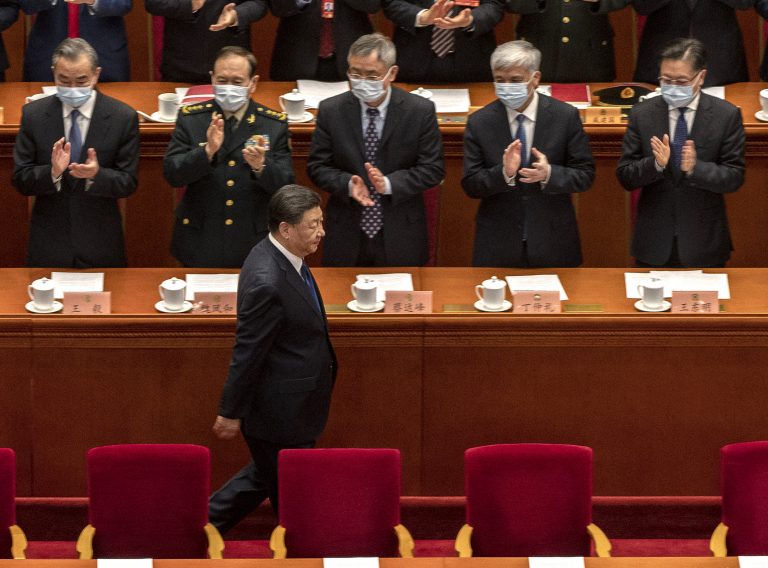Political analysis
On Aug. 16, Chinese leader Xi Jinping went on an inspection tour of Jinzhou city in Liaoning Province. During his visit, Xi visited a memorial commemorating the Liaoshen Campaign in 1948, a major engagement that left the Chinese Communist Party (CCP) with a decisive edge over its nemesis in the ongoing civil war with the Kuomintang nationalists.
Xi praised the “superior strategic vision and planning” of Mao Zedong and other CCP leaders for winning the Liaoshen campaign, and stressed that the Chinese civil war was not just “a battle of arms and firepower, but also a battle for the people’s hearts and minds,” according to state mouthpiece Xinhua.
While Xi was in Jinzhou, Chinese premier Li Keqiang went to Shenzhen in Guangdong Province to promote greater economic liberalization. “China’s opening up will continue to move forward, and the Yellow River and the Yangtze River will not flow backwards,” he said while inspecting Yantian Port. Li also visited Deng Xiaoping’s statue at Lianhuashan Park to present a flower basket. In Shenzhen, Li held a video meeting with senior officials of six “economically strong provinces” to analyze China’s current economic situation and issue requirements for the next phase of economic work.
Xi and Li’s inspection tours in mid-August marked their first public appearance in about two weeks and indicated that senior CCP officials were done with their annual work-vacation meeting at the beach resort town of Beidaihe.
MORE ON POLITICS IN COMMUNIST CHINA
- 3 Key Takeaways From China’s ‘Two Sessions’ Meetings This Year
- China Fights Uphill Battle to Rescue Its Economy While Keeping ‘Zero-COVID’
- Behind the Timing of Didi Global’s $1.2-billion Fine
Success
You are now signed up for our newsletter
Success
Check your email to complete sign up
China commentators have pointed to certain post-Beidaihe developments in arguing that there was fierce infighting among the Party elite at the informal political conclave, and that Xi had likely made political concessions. Some commentators have also argued that cracks in the Party elite are becoming more obvious and that the CCP is headed for very dangerous times.
The CCP is certainly facing increasing dangers as domestic and foreign crises pile up for the regime. However, the various post-Beidaihe developments to date show no change in Xi Jinping’s political status from before Beidaihe and after. If anything, there was a sign that Xi and the Party elite had arrived at some semblance of “consensus” on his 20th Party Congress political agenda during Beidaihe. Yet intra-Party “consensus” and Xi’s presently “stable” political position do not guarantee his political security should crises facing come to a head in the next several months.
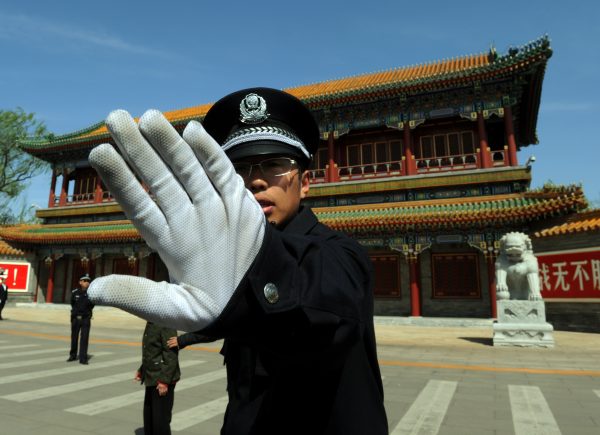
Politically secure–for now
Three developments indicate that Beidaihe had no discernible impact on Xi Jinping’s political status.
First, CCP propaganda and senior officials continue to prominently promote Xi’s political theory, policies, speeches, accomplishments, and paramount position in the Party after Beidaihe. On Aug. 15, or a day before senior officials emerged from Beidaihe, Xinhua announced that the CCP Central Committee ideological journal Qiushi would be publishing an excerpted speech by Xi calling for the Party to “completely, accurately, and fully implement” Xi’s “new development concept.”
Party mouthpiece People’s Daily also kept running articles featuring Xi and his political “achievements” over the past decade on its front page following Beidaihe. Meanwhile, Li Keqiang praised “Xi Jinping Thought” and the leading role of Party Central with “Comrade Xi Jinping at the core” in stabilizing the economy in opening his remarks at the Aug. 16 video meeting with the top leaders of Guangdong, Jiangsu, Zhejiang, Shandong, Henan, and Sichuan.
Second, foreign media carried news during and after the Beidaihe period about Xi preparing to make diplomatic trips again, a sign of the latter’s confidence in his current political status and third term bid. On Aug. 12, The Wall Street Journal reported that PRC officials are preparing for Xi to travel to Southeast Asia in November to attend two summits, meet President Joe Biden in person at the sidelines of one of the summits, and visit countries in the region, citing people familiar with the preparations. Officials involved in the preparations say that Xi is expected to make the Southeast Asia trip after concluding the 20th Party Congress. On Aug. 19, the Journal reported that Xi could travel to Uzbekistan in mid-September to attend the annual summit of the Shanghai Cooperation Organization and meet leaders like Russia’s Vladimir Putin in person, citing people familiar with the planning.
Third, a key crony of Xi’s factional rivals was handed a relatively lenient punishment shortly after the conclusion of Beidaihe. Xiao Jianhua, the founder of Tomorrow Group who was “disappeared” by the CCP authorities from his luxury hotel apartment in Hong Kong in 2017, was sentenced to 13 years in prison and fined 6.5 million yuan by the Shanghai No. 1 Intermediate People’s Court on Aug. 19.
The Shanghai court noted that Xiao’s punishment was “mitigated” due to his “commendable actions” in having “surrendered, admitted guilt, and accepted punishment” — indicating that he is likely to serve less than his full term in prison. Xiao had also already spent five years in detention, which would count towards his time served.
Xiao Jianhua is known to be a “white glove” (bagman) for the clan of Zeng Qinghong and other members of the Party elite. Zeng Qinghong is a former Politburo Standing Committee member and the unofficial number two of the Jiang Zemin faction. In considering intrigue between different regime camps, one possible reason for why Xiao was let off rather lightly is that he had cooperated well with the Xi leadership’s investigation, including providing the latter with dirt on rivals.
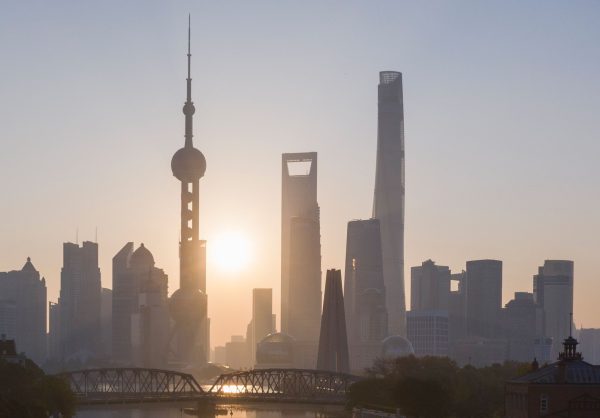
Another possibility is that Xiao’s political patrons did not give Xi much trouble at Beidaihe and could have even reached a “consensus” with Xi on his political agenda. To “reward” the compromise and to preserve intra-Party “consensus,” Xi showed “mercy” towards Xiao by mitigating his punishment.
We see at least three probable scenarios for why Xi’s political status was intact after Beidaihe.
In the first scenario, Xi had already eliminated all rivals and hence went unchallenged. This is least likely given the timing of Xiao Jianhua’s sentencing and Xi’s earlier actions to curb internal dissent, including regulating “improper discussions of Party Central’s major policies” among veteran and retired Party cadres.
A second possibility is that Xi and his enemies reached a temporary ceasefire to allow the Xi leadership to focus on dealing with the many crises plaguing the regime. This is only somewhat likely because factional struggle in the Party elite never truly stopped even during dire periods in PRC’s history, such as during the post-Mao interregnum.
The third option is that Xi tightened security and pandemic prevention arrangements for senior officials and Party elders to the point where they found it difficult to mobilize politically and meaningfully challenge Xi at Beidaihe. This seems more likely given the appointment of Wang Xiaohong as public security minister before Beidaihe, a significant boost for Xi’s authority over the regime’s “knife handle.” Wang is a Xi ally and seasoned public security official who oversaw the provision of security to senior officials at the sub-national level and above when he headed the public security ministry’s special service bureau.
‘Xi-Li split’ redux
China commentators who argue that Xi Jinping faced pushback at Beidaihe and was forced to make concessions tend to believe he is clashing with Li Keqiang. We previously made the case for why there is no “split” between Xi and Li by showing that what seems to be “evidence” of infighting does not pass muster when considering standard CCP operations and factional struggle dynamics.
READ MORE
- Xi Tightens Grip Over Chinese Propaganda Ahead of Key Conclaves
- Does the CCP’s New ‘Historical Resolution’ Give Xi More Power? Not Really.
- In Leaked Recording, Elite Chinese Scholar Laments Crippling Dysfunction of Communist Regime
- China’s Reaction to Biden-Xi Call Exposes Its Fear of International Pressure Amid Russia-Ukraine War
A similar situation has arisen in the case of Li visiting Deng Xiaoping’s statue in Shenzhen. Some commentators say that Li is showing that he prefers Deng’s “reform and opening up” to Xi’s “common prosperity” by paying his respects at Deng’s statue first thing after Beidaihe. However, commentators fail to point out that the Aug. 15 Xinhua article on Xi’s “new development concept” has the latter calling for continued efforts to “deepen reform and opening up,” “introduce more precise reform plans,” and “improve the system more comprehensively.”
Given that the Xinhua article was published just before Li’s Shenzhen trip, it is more likely that Li’s actions there were the result of him being tasked to affirm his boss’s commitment to “deepen reform and opening up” (per Xi’s standards), as well as signal that Xi does not reject Deng’s legacy to assuage concerned parties. And if Li’s actions were approved by the Xi leadership, including him visiting Deng’s statue, then Li can hardly be said to be opposing Xi.
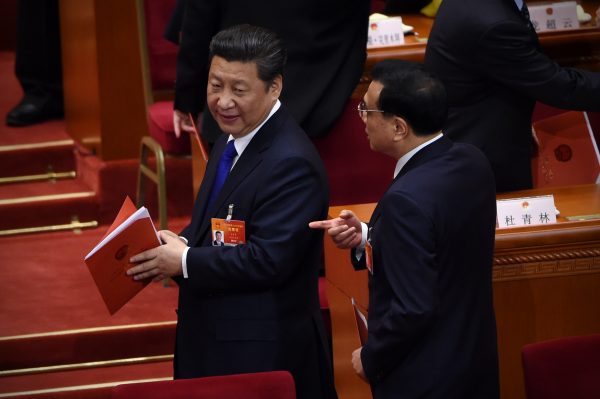
Some commentators have pointed to the regime’s censoring of videos or pictures by private citizens of Li at Deng’s statue or touring Shenzhen as a sign of friction between Xi and Li. Yet they do not note that Xinhua mentioned Li’s visit to Deng’s statue and presentation of a flower basket in its report of Li’s Shenzhen trip. The official recognition of Li paying his respects at Deng’s statue suggests that the censorship was done to strictly control the narrative surrounding a senior cadre’s inspection tour to align with pro-Xi propaganda, rather than to shut down publicity of a Xi “rival.”
Commentators who adhere to the “Xi-Li split” narrative have also viewed the lenient sentencing of Xiao Jianhua as a sign of political concession by Xi Jinping. This view, however, does not hold water if Xi and Li are not fighting amongst themselves. The “political concession” argument also does not stand in considering that CCP propaganda outlets are still promoting Xi and constructing a favorable narrative environment for him to extend his tenure.
Pressure of the times
Xi’s political status seems secure for the moment. Barring unusual circumstances, he is expected to be successful in his bid for a norm-breaking third term at the 20th Party Congress if allowed to maintain and build on current political momentum.
But things could turn south quickly for Xi should the many crises facing the CCP spin out of control. At home, Beijing has to cope with rapid economic deterioration and the triggering of systemic financial risks; worsening property sector debt crisis and spreading financial contagion; energy and food problems caused by droughts; floods and other natural disasters; and growing social anger and loss of confidence in the government over policies like “zero-COVID,” increasing cost of living, wage cuts, rising unemployment, and issues affecting national pride.
Abroad, the Xi leadership has to contend with pressures stemming from Taiwan’s rising global profile and the international community’s increasing willingness to support Taipei; countries becoming more hesitant to invest in China over geopolitical and political concerns; and seemingly unabating U.S.-China tensions.
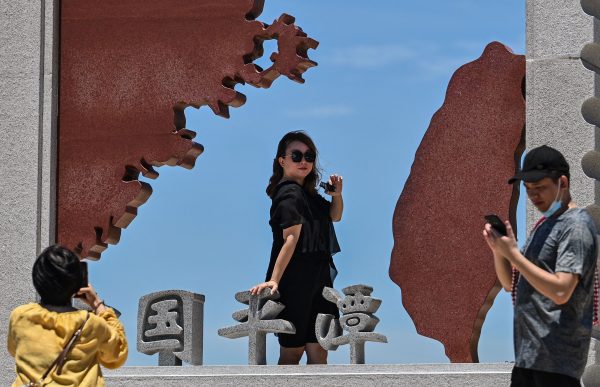
The CCP has recognized the seriousness of its problems. In early July, Qu Qingshan, dean of the Central Party History and Documentation Research Institute, published a 12,000-character article where he warned that “risks in various areas are accumulating and even emerging in a concentrated manner” domestically. He also cautioned about “small risks developing into large risks,” “external risks turning into internal risks,” and “economic risks transforming into political risks.” Qu further warned of an “overall risk that delays or interrupts the process of the great rejuvenation of the Chinese nation, for which we must be highly vigilant.”
Communist regimes appear strong and enduring on the surface, but can prove brittle in times of crisis. At critical moments, serious economic and social problems in China could swiftly translate into existential danger for the CCP and its leaders. If Xi’s factional rivals retain sufficient influence, they could look to leverage uncontrollable outpourings of social anger to ease him out, similar to how Deng moved against Hua Guofeng or how Ye Jianying ousted the Gang of Four.
Even if Xi can tamp down internal resistance and overcome attempts to sideline him from within the regime, such a victory could prove hollow should the Chinese people come to a point where they have had enough of the Party’s social mismanagement, endemic corruption, and endless “stability maintenance.” The Romanian communist dictator Nicolae Ceausescu and his wife were shouted down by an angry crowd in Bucharest that was supposed to be gathered to hear him speak on Dec. 21, 1989. Four days later, the Ceausescus were tried and executed.
The CCP fears the example of Mikhail Gorbachev, who dismantled the Soviet communist regime following the August 1991 coup, as a cautionary lesson. In a leaked speech, Xi himself lamented that “nobody was man enough to stand up and resist” the fall of the Soviet Union.
Xi Jinping has loudly proclaimed his commitment to be that man, clinging tight to the Communist Party and its “Sinicized Marxism.” Yet should the regime be one day forced to the brink, Xi Jinping may be confronted with a sobering — though perhaps not obvious — choice of whether to bow to the pressure of the times, or share in the Party’s fate.
Larry Ong is a senior analyst with New York-based political risk consultancy SinoInsider. He was part of the SinoInsider team that forecasted the 19th Party Congress and 2018 Two Sessions personnel reshuffles with a high degree of accuracy.



